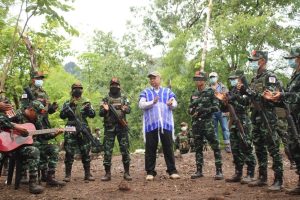It has been just over 15 months since Myanmar’s military junta launched a coup and attempted to grab power from a democratically elected parliament that was waiting to be sworn in. This is not an “internal conflict” as some within ASEAN would like to believe. It is this: a battle between those who believe in freedom, democracy, rule-of-law, and human rights, against one of the most odious regimes in the world. Therein lies an important message to the Association of Southeast Asian Nations (ASEAN) and regional countries that will gather in Cambodia on June 21-22 for the 16th ASEAN Defense Ministers’ meeting.
The vicious, scorched-earth campaign that the junta, now calling itself the State Administration Council (SAC), is waging in a vain attempt to subjugate the people knows no bounds. Its senior leadership, led by Min Aung Hlaing, is directly responsible for orders and actions, beginning in 2016, that murdered thousands of Rohingya and forced more than 700,000 others into Bangladesh, a slaughter on such scale that the U.S. has determined it to be genocide. The United Nations Fact-Finding Mission on Myanmar reached the same conclusion. This brutality continues against the people of Myanmar today.
The criminal military junta single-handedly created the unprecedented humanitarian crisis in Myanmar that has spilled into the region, threatening neighboring states’ national security, including that of including ASEAN members The junta’s brutality has displaced more than 1 million people – an unprecedented number – and more than 12,000 civilian properties including homes and religious buildings have been burned or destroyed by the military, according to the latest report from the U.N.’s humanitarian office. The military has murdered more than 1,800 civilians and arbitrarily arrested more than 14,000, according to the Assistance Association for Political Prisoners, while tens of thousands more have fled to border areas.
The flood of refugees across borders, the unchecked spread of COVID-19, money spent on alleviating the military’s humanitarian catastrophe, the flood of drugs from Myanmar, and the tremendous political capital that must be spent on, once again, dealing with the military’s brutal hand is an anchor around ASEAN’s neck. Every moment having to talk about how to deal with Myanmar’s military is time taken away from building peace, security and economic development within the ASEAN framework.
It has been awe-inspiring to see ordinary citizens, young and old, from all segments of society rise up to reject the junta’s power grab. In urban areas, they have organized themselves into groups under the Civil Disobedience Movement (CDM), using non-violence to fight back against the regime. They have emptied Myanmar streets in protest and are boycotting junta-run businesses.
Tens of thousands have undertaken military training and joined People’s Defense Forces (PDFs) to protect themselves and their neighbors against the marauding military. The strength of PDF forces are growing, their tactics improving, and their integration with each other and ethnic armed organizations increasing. Their defensive arms are also being dramatically upgraded.
For example, in the Chin, Sagaing, and Magwe regions, PDF forces are denying access to junta forces and inflicting heavy losses on them. This is being replicated throughout other parts of the country. In short, Myanmar’s freedom fighters are honing themselves into a well-organized citizen military.
In April of last year, ASEAN met in Jakarta with Min Aung Hlaing following the coup. Out of this meeting came the Five-Point Consensus; it was hoped this could be a platform to halt the violence and provide a bridge for negotiations to place Myanmar on a path to peace and democratic rule. The ink was not even dry on the document before Min Aung Hlaing denounced it in a press release.
ASEAN initially barred the junta from high-level meetings but this sentiment seems to be changing. Some within ASEAN are more interested in solidifying Myanmar military rule than recognizing and respecting the democratic will of the people. Inviting junta defense officials to ASEAN meetings, such as the ASEAN Defense Senior Officials Meeting (ASDM) that took place in May, and this month’s ASEAN Defense Ministers’ Meeting, stains ASEAN’s reputation and denies the Myanmar people the recognition they deserve.
ASEAN is not alone. Japan is also guilty of sending mixed messages regarding the coup. Despite halting some economic assistance, Tokyo recently announced it will invite four Myanmar military officers to attend its National Defense Academy’s training and education program. Why would a democratic country train members of a genocidal military committing horrific human rights abuses? Moreover, part of their study includes arms and combat training; skills that will be used to improve the military’s killing machine. Would Japan invite Russian officers to its NDA program? Clearly not!
Through its actions, ASEAN has lacked credibility when it comes to implementing the Five-Point Consensus. It has yet to officially meet any member of the National Unity Government (NUG). The NUG represents the democratic aspirations of Myanmar’s people. There has been one – just one – meeting between the ASEAN special envoy and the illegal junta. So much for dialogue. No ASEAN goal of building security or peace in the region can be accomplished by letting the military junta represent Myanmar, either formally or informally.
Senior U.S. officials have called for greater engagement with the NUG. Meanwhile, India continues to walk a tightrope with the junta at the upcoming India-ASEAN Foreign Ministers’ Meeting. Engaging with the Myanmar military alone will only prolong this crisis and embolden the Myanmar military to act with impunity.
When ASEAN’s defense ministers meet, they would be wise to remember this: Do not underestimate us. The determination of the peoples’ fight for freedom is not a flame that can be extinguished through time, fear, or violence. Each day we grow stronger. We are here. We are dedicated to a fight to the finish and look forward to establishing a new country, based on the rule-of-law and democratic governance, with a military under civilian leadership. That is the only path forward for Myanmar.
































